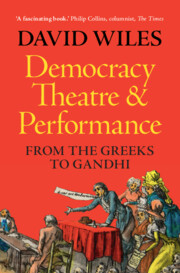Book contents
- Democracy, Theatre and Performance
- Democracy, Theatre and Performance
- Copyright page
- Contents
- Figures
- Acknowledgements
- Introduction
- Chapter 1 Rhetoric in Athens
- Chapter 2 Acting versus Sincerity
- Chapter 3 Puritan Democracy
- Chapter 4 Oratory in the French Revolution
- Chapter 5 American Democracy
- Chapter 6 Democracy as a Universal Good
- Chapter 7 Theatre and Theatrocracy in Democratic Athens
- Notes
- References
- Index
Chapter 3 - Puritan Democracy
The English Revolution
Published online by Cambridge University Press: 17 May 2024
- Democracy, Theatre and Performance
- Democracy, Theatre and Performance
- Copyright page
- Contents
- Figures
- Acknowledgements
- Introduction
- Chapter 1 Rhetoric in Athens
- Chapter 2 Acting versus Sincerity
- Chapter 3 Puritan Democracy
- Chapter 4 Oratory in the French Revolution
- Chapter 5 American Democracy
- Chapter 6 Democracy as a Universal Good
- Chapter 7 Theatre and Theatrocracy in Democratic Athens
- Notes
- References
- Index
Summary
Max Weber understood how democracy in the seventeenth century was tied to Calvinist individualism and the rejection of external forms. Thomas Hobbes hated the consequences of puritan rule and argued that politics needed to accept the principle of the mask in order to create social order. The lawyer William Prynne in his Histrio-mastix portrayed theatre as the root of all evils in the royalist regime, but he himself proved a masterly performer in working to undermine the regime. The most radical democratic thinking came from the ‘Levellers’ who harked back to the Garden of Eden and natural human innocence. Shakespeare interrogated the ambivalent myth of Eden in Henry VI Part Two, as did Milton in Paradise Lost. The Putney debates constitute the main focus of this chapter. Common soldiers with Leveller views argued with their generals about constitutional principles. Close analysis of the debate reveals the complications that followed from claims to sincerity, couched as insistence that because God had spoken to them speakers were following their consciences, avoiding rhetoric or hypocrisy. The religious context in fact allowed a high level of democratic exchange.
Keywords
- Type
- Chapter
- Information
- Democracy, Theatre and PerformanceFrom the Greeks to Gandhi, pp. 63 - 89Publisher: Cambridge University PressPrint publication year: 2024

